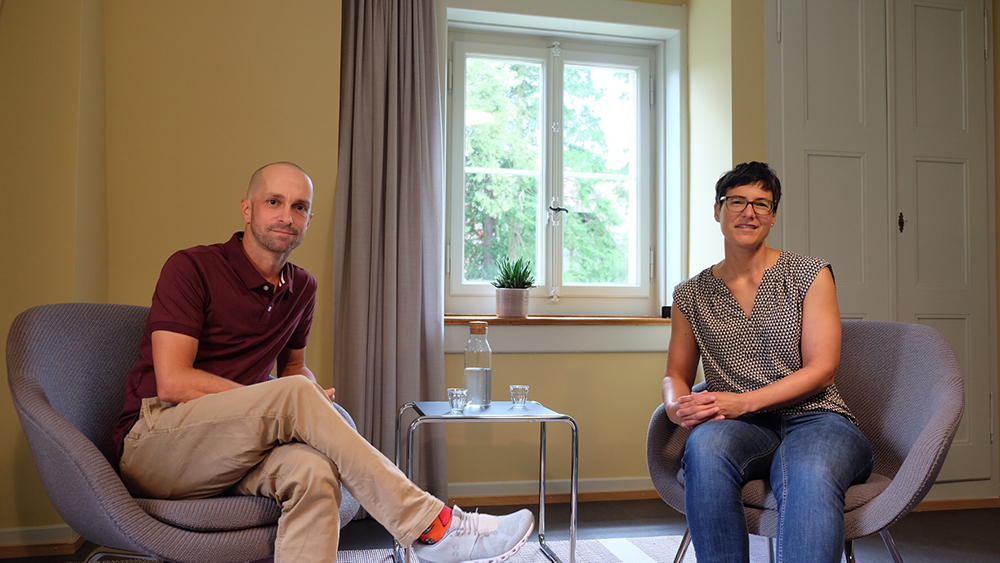Navigation auf uzh.ch
Navigation auf uzh.ch

Rebecca Saladin and Marc Seematter join me online for our interview from their new offices at Plattenstrasse 54. After various temporary locations, the Employee Assistance Office has now found its permanent home: On the top floor of a stylish villa typical of Zurich-Hottingen.
The two co-leaders of the service for UZH employees are clearly pleased with their new premises. “We are centrally located in the university quarter, yet far enough away from the UZH main building with all its hustle and bustle. Here we have the privacy and relaxed atmosphere we need for our work,” says Saladin. She wants people who come here for appointments, whether just once or several times, to feel comfortable from the moment they walk in the door. “We believe that those seeking advice can more easily engage in a counseling situation in a quiet, comfortable environment.”
Saladin and Seematter know from experience how difficult it is for many people to seek professional support when faced with difficulties at work. “We all have a certain inhibition when it comes to asking for help,” says Marc Seematter, who provides legal advice and mediation in work-related conflicts. Some are afraid that they will be plunged into full-on therapy, while others worry that speaking up will trigger formal internal measures, investigations or far-reaching consequences.
Psychologist Rebecca Saladin offers reassurance in this regard: “We offer quick and unbureaucratic short-term support and orientation – but explicitly do not provide therapy or extensive coaching. In very complex situations and if people want longer-term support, we point them in the direction of other services within or outside UZH.”
Seematter is also keen to dispel any worries: “We are completely independent, and anything said in our office is completely confidential. We have no duty to provide information to any other party, let alone any professional or disciplinary authority to issue instructions to other persons and offices of UZH. Talking to us will not result in any consequences.”
The Employee Assistance Office is intended as a short-term counseling service with a focus on three advisory services: Psychological counseling for work-related stressful situations, legal advice for work-related problems, and arbitration and mediation between parties in work-related conflicts.
Last year, 160 UZH staff members from all faculties as well as from various Central Services units contacted the Employee Assistance Office to seek advice and support. Almost 50 percent of requests were for psychological counseling, making that the majority of the office’s activities.
In addition, there were requests for purely legal advice, the majority of which related to questions concerning working conditions, authority to issue directives or a potential or definite termination of employment. About 30 percent of the requests required multi-faceted advice and support. “Sometimes,” explains Marc Seematter, “a legal issue is in the foreground while in the background, on closer examination, personal or interpersonal issues also play a major role. On the other hand, it may emerge during psychological counseling that legal issues are involved. And sometimes, a need for mediation then arises between the different parties to a conflict.”
“Since the people who turn to us for psychological counseling often find themselves in complicated, problematic or complex situations, the initial consultation is used to assess the situation and clarify the details,” says Rebecca Saladin. In the initial conversation, as the employee explains the problem and Saladin listens and asks questions, the sticking points in a seemingly deadlocked situation can often be identified relatively quickly. “The second step is then to develop potential solutions for the concerns that have been raised.”
In the case of difficult work situations, the psychologist examines both the structures, i.e. the work procedures and processes in which a person is involved, and the interpersonal area, especially communication with colleagues and superiors. The main questions she asks herself are: What room for maneuver is open to the person seeking advice? What measures can they take independently to improve the situation? And what measures are available to support the employee’s self-empowerment and self-care? “People are often surprised at how much creative freedom and influence they actually have in the workplace.”
Saladin says this is in line with the main aim of the Employee Assistance Office: Namely to empower those seeking assistance to proceed independently on the path defined together, and to enable them to find their own solutions for difficult situations.